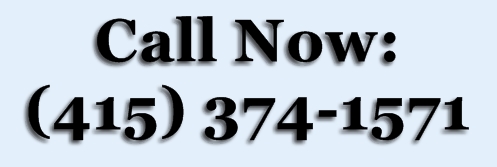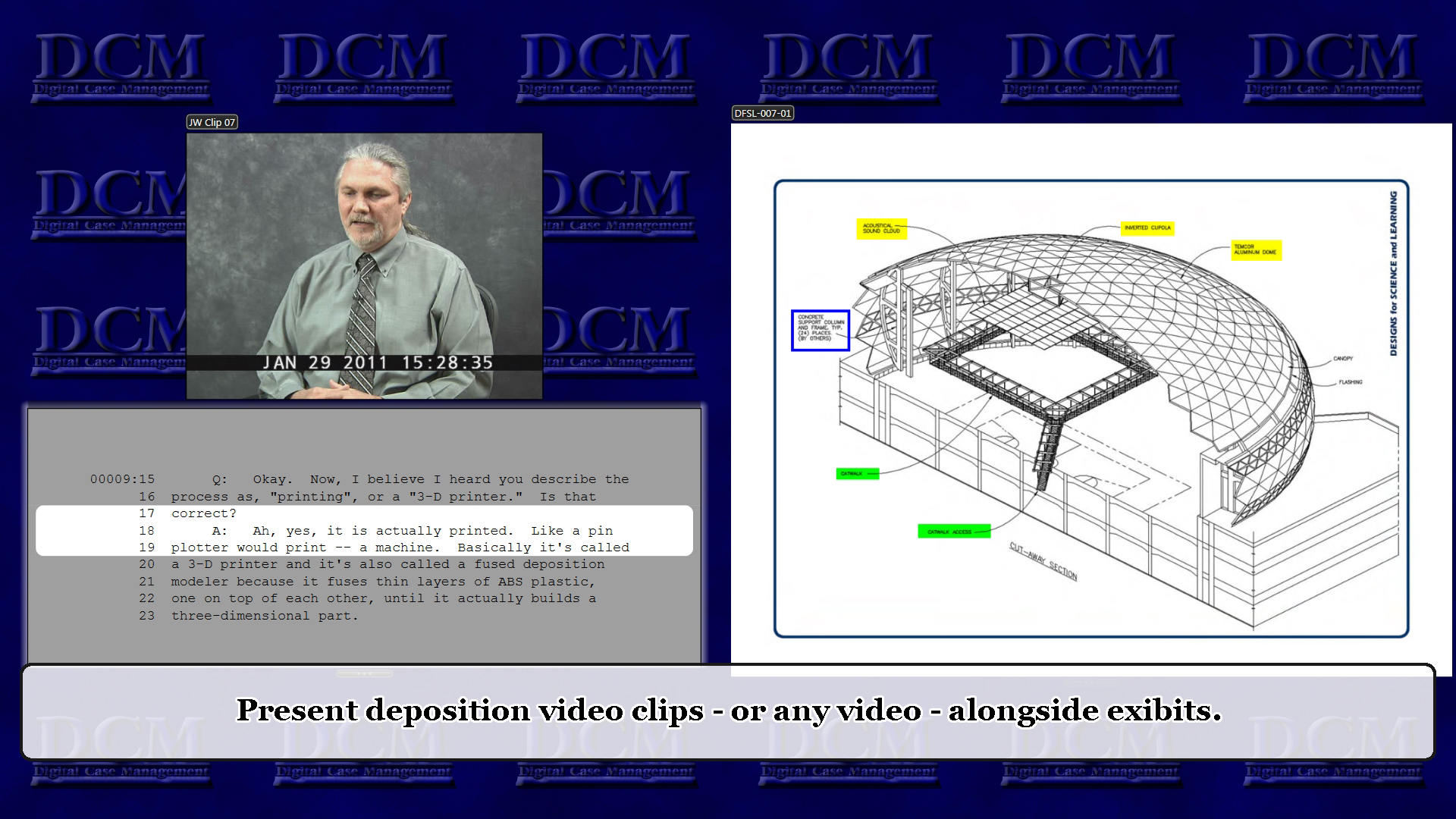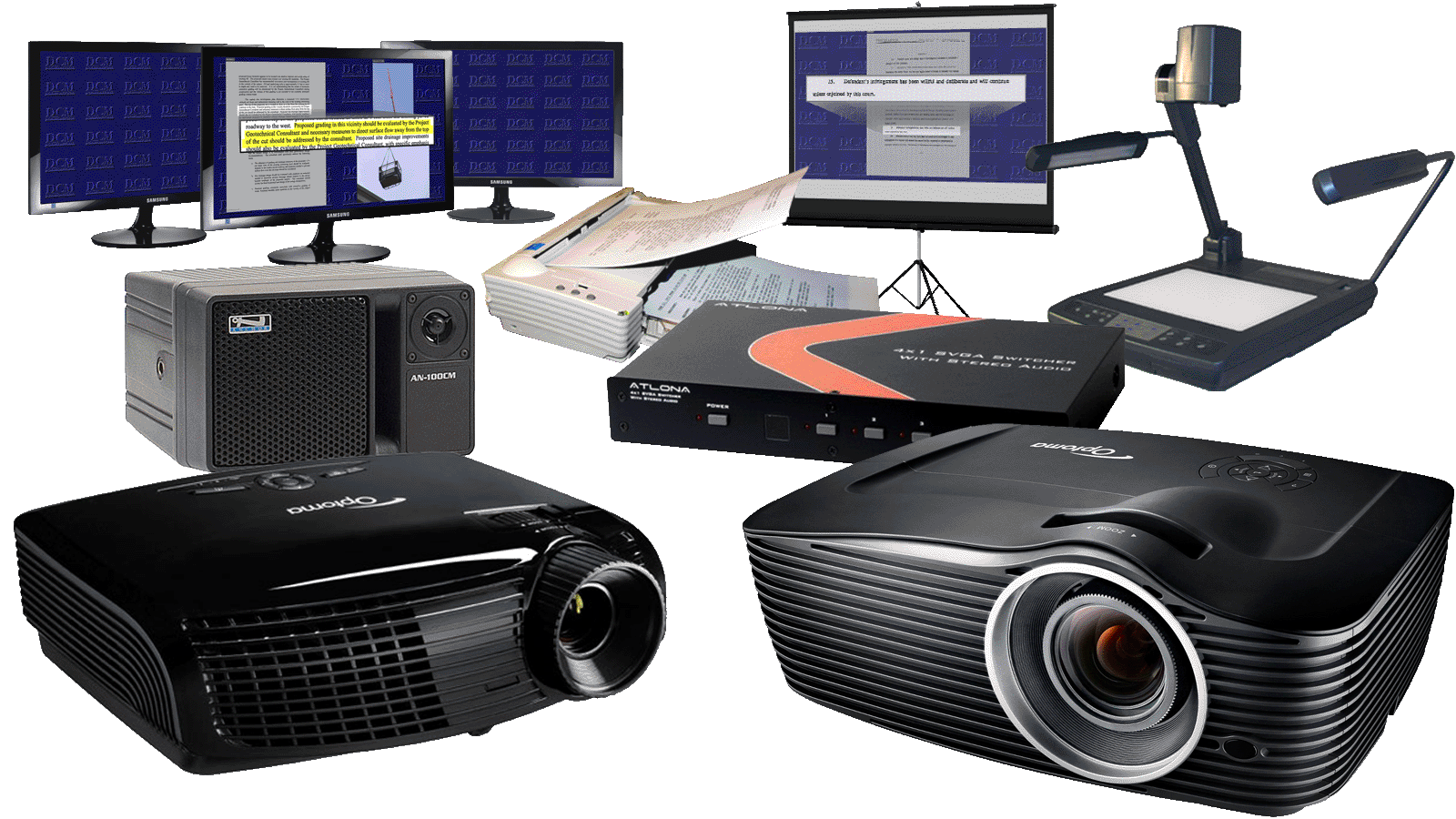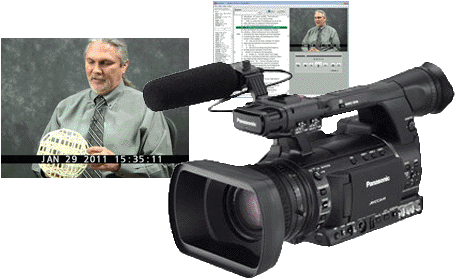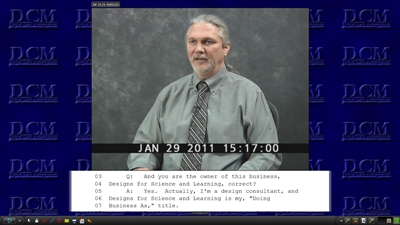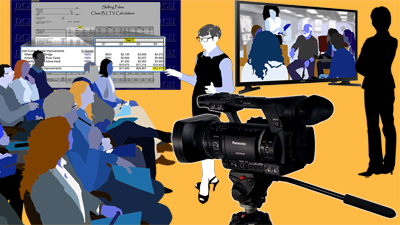Litigation Technology Services
Frequently Asked Questions
Don't see your question?
Submit yours by sending us an email!
Submit yours by sending us an email!
Frequently Asked Questions about Deposition Videography
1. Why record a deposition?
2. Can a witness refuse to be video recorded in their deposition?
3. Who hires the deposition videographer?
4. How is deposition video used in trial?
5. What is “Impeachment”?
6. Are deposition videographers certified by state or federal government?
7. Can a deposition be taken with a videographer instead of a court reporter?
8. What depositions require that a videographer be a notary public, and why
9. Can deposition video be used at trial instead of live testimony?
10. How should a witness prepare for their videotaped deposition?
11. Will a video deposition pick up what my attorney whispers to me, and if so, will that go into the record?
12. Can deposition video be edited?
13. What is deposition synchronizing?
14. What is DepoView?
2. Can a witness refuse to be video recorded in their deposition?
3. Who hires the deposition videographer?
4. How is deposition video used in trial?
5. What is “Impeachment”?
6. Are deposition videographers certified by state or federal government?
7. Can a deposition be taken with a videographer instead of a court reporter?
8. What depositions require that a videographer be a notary public, and why
9. Can deposition video be used at trial instead of live testimony?
10. How should a witness prepare for their videotaped deposition?
11. Will a video deposition pick up what my attorney whispers to me, and if so, will that go into the record?
12. Can deposition video be edited?
13. What is deposition synchronizing?
14. What is DepoView?
Answers:
1. Why video record a deposition?
The most common use of video testimony is to use selected portions of testimony to impeach a witness if they change their story at trial. Seeing a witness contradict themselves on the video has a much greater impact than simply reading back the written transcript testimony.Another common reason is that an attorney may want to videotape a deposition to preserve the witness’s testimony in case the witness dies, becomes too ill, flees or otherwise is unavailable to testify in court.The law in some jurisdictions (like California) allows for certain expert’s testimony to be presented by video, even if they are available to testify in court in person. A video deposition of an expert witness can save money and time.A video recording can provide better insight into deposition testimony for expert consultants and legal staff who can not attend a deposition. Video can be reviewed and scrutinized, and is also frequently used in mock trials and focus groups.Finally; another not-uncommon reason for hiring a videographer is for the calming effect it has on disruptive attorneys and litigants. People are on better behavior when a videographer is recording the event, and this can mean the difference between a two-day and a one-day deposition.
2. Can a witness refuse to be video recorded in their deposition?
Not usually. A video-recorded deposition has been considered the right of any party to a lawsuit for many years. One can always file a motion with the court to prevent it and hope for the best, but one would have to have a very good reason. "I don't like being videoed!" has not, to my knowledge, ever been a good reason. You can consider it just a legal fact of life.
On the other hand, the intent to video record must be included in the notice of deposition. I have encountered many law firms that do not include that little bit of language in their standard deposition notice forms! There is no reason why the boilerplate notice for all your deposition notices should not include the intent to video record. One is not obliged to do so if one notices it, but it does insure one has the option to do so.
If your opponent has not included the intent to video record in their notice to depose you, wait until the deposition. If a videographer shows up, you have every right to refuse to allow it. I have set up my video kit at many depositions only to be asked to leave for this very reason.
3. Who hires the deposition videographer?
The videographer may be hired by any attorney who is a party to the case and/or deposition, although it is usually the same attorney who set the deposition and hires the court reporter.
4. How is deposition video used in trial?
In the case of an absent witness, video is presented in lieu of their live testimony, with objections and overruled questions edited out beforehand.
In the case of impeachment, or for “any purpose” as decided by a party, particular segments are selected for presentation. They can be a single question and answer, a short sequence of several questions & answers, or several pages from a transcript. A sequence need not be a contiguous piece of video; one can pick questions and answers from different times of the deposition. (Obviously, one cannot pair a question with an answer to a different question.)
Additionally, there are those cases with a very large number of witnesses. The judge may order that the deposition video will be used for all or most of the witness testimony simply as a practical solution.
5. What is “Impeachment”?
Impeachment is challenging the truthfullness of a witness at trial by presenting the witness’s own contradictory deposition testimony. This can be done by the attorney simply reading back the contradictory statement to the courtroom. However this is often done by use of a synchronized video deposition, in which the jury sees and hears the witness making the contradictory statement, and includes the transcript text on the screen to ensure the words are fully understood.
Often, one knows that a particular witness is likely to change their story when they get on the stand, and you can prepare impeachment clips in advance. Sometimes, however, a witness will alter their story unexpectedly, but it still takes only a minute or less to create an impeachment clip on-the spot.
Having all of your depositions videorecorded and synchronized comes in handy at a time like this.
6. Are deposition videographers certified by state or federal government?
No; however in some states, like California, the code of civil procedures dictates that a deposition videographer must be, “authorized to administer an oath,” i.e. be a notary public (or a certified court reporter, judge, court bailiff, etc.) for certain types of depositions.
You may see some videographers advertising themselves as “Certified” by some organization, but this is a purchased certification, acquired after completing some minimal amount of training and paperwork. It has no connection with any government, has no legal status at all, and is no indication of the videographer’s experience or qualifications.
7. Can a deposition be taken with a videographer instead of a court reporter?
Yes, it is technically allowable. However it is not advisable. A written transcript will almost always be needed if it is ever to be used in court, so that expense is still incurred. Furthermore, portions of an audio are often unintelligible, even with the best recording technicians. Nothing is better than having the court reporter there at the time of the deposition to ask for clarifications and get the actual words from the speaker at the time they are spoken.
Yet there are times when video (or audio only) is the only method available to record a deposition. This can occur when a scheduled court reporter is unable to attend and a replacement can’t be found in time. Or, in remote locations like the Alaskan wilderness or Antarctica, a reporter simply cannot be found. If both parties so stipulate, the audio or video recording can be designated the official record. It would help if the videographer is a notary public, so someone can swear-in the witness. Without a swearing-in there is no deposition.
The videographer should then take extra care to record clear audio, and ask for the same sorts of clarifications that a reporter would ask for when what is said is unintelligible.
8. What depositions require that a videographer be a notary public, and why?
Every state has different laws, so check your local code of civil procedures. However, in California, the relevant section of CCP 2025 states that any video of a treating physician or expert witness taken with the intention of using it in lieu of live testimony must be recorded by someone authorized to administer an oath. Being a notary public satisfies that requirement. The videographer doesn’t have to administer the oath, but he or she must have that authority. This is why many professional videographers in California are notaries public.
9. Can deposition video be used at trial instead of live testimony?
Only if stipulated by both sides and agreed to by the judge. The law requires that if a witness is available, their presence in court is required to give testimony. However, in California and other states, rules are somewhat relaxed for expert witness testimony. If requested by the relevant party, an expert can be excused from appearing at trial and their video testimony is presented instead.
This often requires that the deposition be taken in two parts: First a “Discovery” depo is taken, in which both sides discover what the expert has found and will say. Then a “Trial Testimony” deposition is done immediately afterwards, in which one side may more aggressively attack the expert and the other side might vigorously defend.
However, as per answer #8 above, make sure your videographer is a notary public. In fact, make sure your expert witness videographer is always a notary public, to preserve your option to present the deposition video as testimony, even you don't plan to.
10. How should a witness prepare for their video recorded deposition?
The same way as they should prepare for any deposition - except for certain presentation issues. Here are some tips for presenting oneself appropriately and avoiding some common mistakes:
Avoid wearing shirts that are red, white, fluorescent or with flourescent decoration. Avoid tight patterns like herringbone or very small check. Avoid shiny jewelry. Necklaces, floppy collars or dangly earrings can interfere with the operation of the lavaliere microphone that the witness will have to wear. Wear normal glasses or contacts. Do not wear sunglasses. If the witness only has prescription sunglasses, do something about that.
The witness should sit up straight and adjust the chair as necessary for good posture. Higher at the table is better than lower. Avoid twirling, rocking and rolling in the chair. Some sitting habits, although quite innocent, can look glib, flippant, unintelligent or even sarcastic on camera. On the other hand; being relaxed, leaning back once in a while, and shifting position every now and then is just fine. The idea is to be personable and normal on camera.
Remember that you are wearing a microphone! Don’t mutter or curse under your breath. Don’t play with the wires, click your ball-point pen or crumple candy wrappers while wearing a microphone.
Finally: Do not look directly into the camera. It’s creepy and phony. Only news anchorpersons can look directly into the camera and get away with it.
11. Will the video pick up what my attorney whispers to me, and if so, will that go into the record?
"Yes," and, "Maybe." Lapel microphones used in depositions are designed to pick up anything the wearer may say and can easily pick up whispers. the videographer may turn down the mic when this starts happening, but is not obliged to and may not even notice it.
You can assume that if it was recorded that is will be faithfully copied to anyone who orders the video. The law prohibits anyone from altering the original recording.
The court reporter is probably wearing headphones. If the court reporter hears it, she or he will probably put it into the transcript. That is their job. Many a time an attorney has taken a reporter to court to force them to remove a curse muttered under one's breath. Never has this succeeded.
12. Can deposition video be edited?
For trial presentation, deposition video is usually edited down to just those segments (or “excerpts”) that someone wants shown. Even in the case of video testimony presented in lieu of a witness’ appearance, objections and overruled questions are edited out before it is presented.
But the original is always maintained intact.
13. What is deposition synchronizing?
Synchronizing is the process of linking the deposition video file to the transcript, so that the transcript scrolls line by line in synch with the video as it plays. The result is similar to captions on a TV show.
The synchronizing process takes place after the deposition and after a final transcript has been created. It requires some kind of playback software to make use of it (like TrialDirector or Sanction), or simple playback applications such as DepoView. Windows Media Viewer can also playback synched files if the video file is properly formatted and the player is set up to play captions.
Synchronizing is useful during discovery by enabling instant playback of the video of any specific portion of the transcript. Clips of the deposition can be used in mock trials and focus groups to test how a witness will be perceived. It allows much faster deposition video editing, and instant clip creation on the fly, even in court. Synchronized deposition video is one of the most popular and useful digital presentation tools available to attorneys.
14. What is DepoView®?
DepoView® is an application that plays back synchronized deposition video, allows one to make clips and export clips to other software. You can create all your clips with this app and transfer all the work to TrialDirector, a more comprehensive trial presentation software. It is available by request at no charge from some videographers (like DCM - Digital Case Management), and comes packaged with your synchronized deposition video. For more information, see our Synchronizing page for pictures and a demo video.
More services from
DCM - Digital Case Management:
DCM - Digital Case Management:
Present your evidence on-screen by an experienced digital trial technician. Make depo clips, annotate documents, move through your arguments more quickly and easily. Click the link below to learn more.
DCM has video projectors, audio amplifiers, projection screens, audio amplifiers, monitors and everything you need to equip a courtroom for a digital trial presentation. Learn more:
We record with HD Cameras, properly place our microphones for clear audio and use professional backdrops. Make sure you have the best video depositions when you go to trial. Click the pic to learn more.
Have your deposition video and transcript expertly synchronized by DCM. Play depo excerpts in court or at hearings. Click the image below for more info.
Combine our trial services with our videography for experienced mock trial and focus group technical services. We'll help you present evidence, record the proceedings and provide remote viewing for unseen observers. Click the link below to learn more.
Record, archive and show your powerpoint presentations on your website. We will create an interactive document that viewers can access on demand and review at their own pace. Click below for more info and a demo.
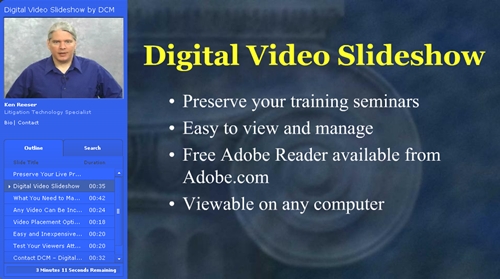
Present your evidence on-screen by an experienced digital trial technician. Make depo clips, annotate documents, move through your arguemnts more quickly and easily. Click the link below to learn more.
DCM has video projectors, audio amplifiers, projection screens, audio amplifiers, monitors and everything you need to equip a courtroom for a digital trial presentation. Learn more:
We record with HD Cameras, properly place our microphones for clear audio and use professional professional backdrops. Make sure you have the best video depositions when you go to trial. Click the pic to learn more.
Have your deposition video and transcript expertly synchronized by DCM. Play depo excerpts in court or at hearings. Click the image below for more info.
Combine our trial services with our videography for experienced mock trial and focus group technical services. We'll help you present evidence, record the proceedings and provide remote viewing for unseen observers. Click the link below to learn more.
Record, archive and show your powerpoint presentations on your website. We will create an interactive document that viewers can access on demand and review at their own pace. Click below for more info and a demo.




